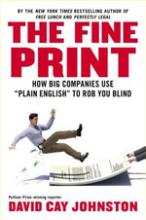
A recent book by David Cay Johnston, The Fine Print, examines specifically how big companies have found ways to take advantage of the tax and regulatory systems to their benefit and to the detriment of consumers. The sad part - we don't even realize it.
Johnston discusses how big companies and their leaders exploit tax rules to re-distribute wealth upwards. Johnston also examines how this exploitation is almost never covered in the media, encouraging big companies to stoop to new lows in ripping off consumers. Telecommunications is one of the industries he covers in the new book.
In the first chapter (read the first chapter via Democracy Now!), Johnston describes how friend and journalist, Bruce Kushnick, came across twenty years' worth of telephone bills in his elderly aunt's possessions. Kushnick tracked the changes in her bills, systematically reviewing and comparing every charge. Kushnick found an array of confusing and cryptic "fees," "charges," and "taxes." The end result:
When he cross-checked his aunt’s telephone bills over the years, he could hardly believe the numbers. His aunt paid $9.51 for her local phone service in 1984. By 2003 her bill had swollen fourfold to $38.90. In the two decades since the breakup of the AT&T monopoly, even after adjusting for inflation, his aunt’s telephone cost $2.30 for each dollar paid in 1984. And that was without any charges for long-distance calls.
Johnston notes the method used by telecoms to increase prices over time:
Bit by bit, the line items grew, and others were added. It was easy to miss the escalating prices because they came separately over time—a nickel on one line of the bill, a quarter or two on another. With many small line items, people tended not to notice how the total was creeping upward much faster than the rate of inflation or the size of their income.
As we continue to watch, big telcos like AT&T take every opportunity to ensure their monopolistic advantage so they can continue these types of activities. Our readers know about the millions invested in lobbying to prevent municipalities from taking steps to providing the means to encourage competition. We see over and over again how any whiff of potential threat to a monopoly will bring swift and heavy retribution.
Johnston also spoke with NPR in a recent interview on Fresh Air. During the conversation, he talked about how the drive to bring benefits of ubiquitous connectivity has fizzled:
We've paid, between cable company rate increases and telephone company rate increases, over a half-trillion dollars to get the Internet.
But what quietly happened without much attention is that the Internet, the standard that these companies had to meet, was a very low standard, far below the quality of the Internet that people have in other modern countries. America invented the Internet, so by the fact is it started out as number one. We now rank 29th in the speed of our Internet, according to Pando Networks.

In the interview, Johnston talks about Lafayette, Louisiana, and how AT&T, Verizon, and other big telcos have used legislatures and influence to twist regulations as a way to maintain their monopolies:
We are paying super-high prices for low speeds and poor quality, and a number of cities that did not have quality high-speed Internet have built municipal systems. And a good example I tell in the book is about Lafayette, Louisiana. The town fathers there were not going to get electricity over 100 years ago, so they created a municipal electric system.
Well, they also built a municipal Internet, and it is so high-powered and so fast that a lot of the work done for the Pixar animated movies is done, not in Hollywood, but in Lafayette, Louisiana.
Well, the response from AT&T, Verizon, Cox, Time Warner and the other cable and telephone companies has been to go to the legislatures and say we want a law passed that either blocks or makes virtually impossible to build municipal systems. That's competing with our business interests. And that's part of the whole strategy they have: We want to be monopolies without competition; we want to run the system in our interest to maximize our profits, with no regard for the overall economy of the United States.
We wrote the definitive case study of Lafayette's fiber network in our Broadband at the Speed of Light report. Also from the NPR interview:
So what I'm arguing in the book is we need to have a balanced policy. We need to have a policy not just written by and for telephone and cable companies but written to promote the entire economy. If we wired our whole country with a super-fast Internet that can handle all telecommunications services, and we charged appropriately so that the companies earn a respectable profit for it, and the customers pay a reasonable price, I think you would see industries, that no one can imagine today, arise.
In his book, Johnston also covers how big companies and the very wealthy exploit the tax system to avoid contributing to the tax roles. There are even issues of public safety - utility companies receiving waivers to avoid inspecting gas lines due to slack regulations - that have resulted in catastrophe and that are almost never covered in the news.
Democray Now! describes the book:
"The Fine Print: How Big Companies Use "Plain English" to Rob You Blind"... claims you are being systematically exploited by powerful corporations every day. He writes that these companies squeeze their trusting customers for every last cent, risk their retirement funds, and endanger their lives. And, says Johnston, they do it all legally. We’ll ask him to explain the fine print.
The book has also been noticed by VentureBeat's John Koetsier, who focuses on what this type of environment does to our Internet situation:
Slower Internet than Bulgaria. Data rates 38 times more expensive than Japan. And only 5 percent of the upload speed generally found in France.
In his new book The Fine Print, Pulitzer Prize-winning journalist David Cay Johnston tell us, among other things, what’s wrong with the Internet in America. The answer is fairly depressing: It’s too slow, too expensive, and … too controlled by a duopoly of AT&T and Verizon.
Here are two interviews with Johnston, who talks about his book, his findings, and the state or corporate power in the Unted States.







